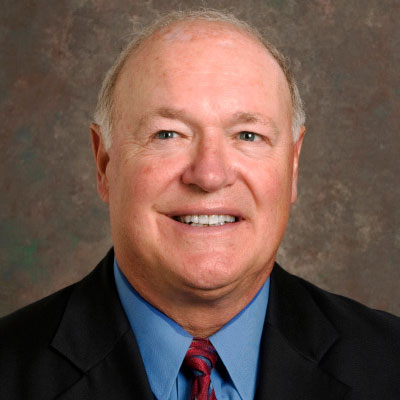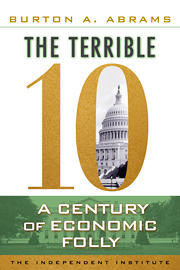“Those who cannot learn from history are doomed to repeat it,” wrote the philosopher George Santayana. What does the study of economic policy mistakes tell us about how to keep ourselves from making the same blunders that our forbears made?
In my book The Terrible 10: A Century of Economic Folly, I examine the most destructive economic policies that politicians have inflicted on the United States since the early 1900s. Let’s look at some of their causes and see how we might avoid repeating past mistakes.
Special Interest Influence. Campaign contributions by special interests seem to have played a role in some of the worst blunders of the past century, including the Hawley-Smoot tariff hike, Medicare Part D, environmental mismanagement, and lax regulatory oversight of Fannie Mae and Freddie Mac. Would stronger campaign finance laws reduce improper interest-group pressure?
Skeptics have history on their side: Whenever campaign-finance reforms have been enacted, special interests have found loopholes to circumvent their aim. Reforms passed in 2002, for example, simply steered large contributions toward political action committees. Now campaigns cost more than ever. But even when election donations don’t come directly into play, special interests can reward retired politicians with lucrative jobs as lobbyists or influence peddlers.
But what if lawmakers’ salaries and pensions were raised substantially on the condition that lawmakers never accept any lobbying jobs or compensation even after they leave office? Might this reduce influence peddling? Perhaps, but crafty people would look for ways to circumvent such restrictions—such as via lobbying jobs for a politician’s spouse or children, or similar maneuvers. Any laws of this type would need constant monitoring and revision.
A better way to break the abuse of money in politics may be to strengthen transparency and disclosure requirements. Even better would be to somehow limit the value of favors that politicians can dole out.
Short-Run Obsession. Here’s the dark side of democracy: Elections create perverse incentives for politicians to focus on getting re-elected and to neglect problems that arise many years later. Disasters caused by this short-run obsession include pay-as-you-go Social Security, Medicare, and recklessly large public indebtedness.
How can we make politicians pay more attention to the long run? Members of the House of Representatives are constantly seeking campaign contributions because they are up for re-election every two years. Suppose their terms were lengthened but the number of terms were limited? We could also restrict senators and presidents to, say, an eight-year nonrenewable term. Such proposals are intriguing but are no panacea.
A better approach might be to impose rules that limit the scope of decision-making by public servants. A rule requiring Federal Reserve policymakers to focus only on price stability or a low inflation rate, for example, would have reduced the political pressures that led to the Great Depression and, later, the Nixon-Burns business cycle.
A well-designed rule requiring a balanced budget when the economy approaches full employment or a rule limiting the national debt to some percentage of national income would restrain government from excessive deficit finance that pushes costs onto future taxpayers.
Policymaker Ignorance. Politicians and government bureaucrats are often very ignorant about the long-term effects of their policies. One egregious example is the pay-as-you-go Social Security system.
In 1939, Senator Arthur Vandenberg (R-MI) said he thought a fully funded retirement system was a “leech on society.” But the reform Congress enacted was much worse. It kept payroll taxes lower—but only temporarily. Now we suffer from an unfunded system that has reduced savings and investment, and requires major new taxes or repudiation of promised entitlements.
Can policymaker ignorance be corrected? Years of experience with bad trade policies, and economists’ vocal opposition to restraints on trade, seem to have made lawmakers less protectionist. Perhaps elected officials should be required to pass an economics course before taking office. Perhaps more regulatory policies and spending programs should be required to pass a rigorous cost-benefit test.
In the final analysis, our public policies will be only as good as our electorate is smart. Unless voters take the time to understand the issues—including their economic and historical contexts—we will indeed be condemned to repeat past mistakes.









